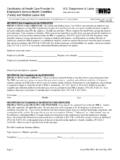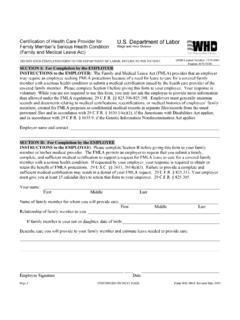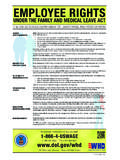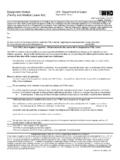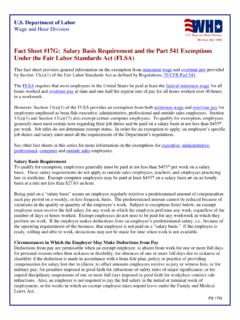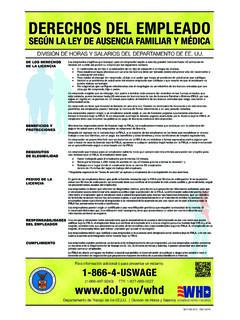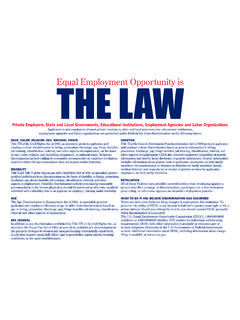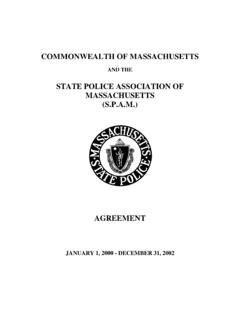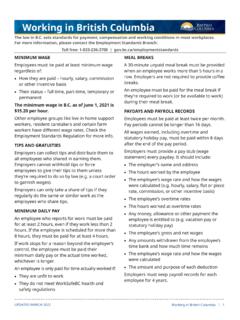Transcription of Fact Sheet #71: Internship Programs Under The Fair Labor ...
1 Department of Labor wage and Hour Division (Updated January 2018) Fact Sheet #71: Internship Programs Under The Fair Labor Standards Act This fact Sheet provides general information to help determine whether interns and students working for for-profit employers are entitled to minimum wages and overtime pay Under the Fair Labor Standards Act (FLSA).1 Background The FLSA requires for-profit employers to pay employees for their work. Interns and students, however, may not be employees Under the FLSA in which case the FLSA does not require compensation for their work. The Test for Unpaid Interns and Students Courts have used the primary beneficiary test to determine whether an intern or student is, in fact, an employee Under the In short, this test allows courts to examine the economic reality of the intern-employer relationship to determine which party is the primary beneficiary of the relationship.
2 Courts have identified the following seven factors as part of the test: 1. The extent to which the intern and the employer clearly understand that there is no expectation of compensation. Any promise of compensation, express or implied, suggests that the intern is an employee and vice versa. 2. The extent to which the Internship provides training that would be similar to that which would be given in an educational environment, including the clinical and other hands-on training provided by educational institutions. 3. The extent to which the Internship is tied to the intern s formal education program by integrated coursework or the receipt of academic credit. 4. The extent to which the Internship accommodates the intern s academic commitments by corresponding to the academic calendar.
3 5. The extent to which the Internship s duration is limited to the period in which the Internship provides the intern with beneficial learning. 6. The extent to which the intern s work complements, rather than displaces, the work of paid employees while providing significant educational benefits to the intern. 7. The extent to which the intern and the employer understand that the Internship is conducted without entitlement to a paid job at the conclusion of the Internship . 1 The FLSA exempts certain people who volunteer to perform services for a state or local government agency or who volunteer for humanitarian purposes for non-profit food banks. WHD also recognizes an exception for individuals who volunteer their time, freely and without anticipation of compensation, for religious, charitable, civic, or humanitarian purposes to non-profit organizations.
4 Unpaid internships for public sector and non-profit charitable organizations, where the intern volunteers without expectation of compensation, are generally permissible. 2 , Benjamin v. B & H Educ., Inc., --- ---, 2017 WL 6460087, at *4-5 (9th Cir. Dec. 19, 2017); Glatt v. Fox Searchlight Pictures, Inc., 811 528, 536-37 (2d Cir. 2016); Schumann v. Collier Anesthesia, , 803 1199, 1211-12 (11th Cir. 2015); see also Walling v. Portland Terminal Co., 330 148, 152-53 (1947); Solis v. Laurelbrook Sanitarium & Sch., Inc., 642 518, 529 (6th Cir. 2011). Courts have described the primary beneficiary test as a flexible test, and no single factor is determinative. Accordingly, whether an intern or student is an employee Under the FLSA necessarily depends on the unique circumstances of each case.
5 If analysis of these circumstances reveals that an intern or student is actually an employee, then he or she is entitled to both minimum wage and overtime pay Under the FLSA. On the other hand, if the analysis confirms that the intern or student is not an employee, then he or she is not entitled to either minimum wage or overtime pay Under the FLSA. Where to Obtain Additional Information This publication is for general information and is not a regulation. For additional information, visit our wage and Hour Division Website: and/or call our toll-free information and helpline, available 8 to 5 in your time zone, 1-866-4 USWAGE (1-866-487-9243). Department of Labor Frances Perkins Building 200 Constitution Avenue, NW Washington, DC 20210 1- 866-4-USWAGE TTY: 1-866-487-9243 Contact Us
